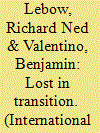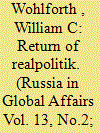| Srl | Item |
| 1 |
ID:
189856


|
|
|
|
|
| Summary/Abstract |
The article investigates the impact of the 2022 European security crisis on
global hegemony. The author conceptualizes international hegemony as
a legitimate rule based on the provision of club and public goods, and on
coercion. The more benefits a hegemon’s allies get from such international
order and the more they fear coercion, the more they are willing to
contribute to the hegemonic project. In recent years, the academic
literature has increasingly documented the United States’ decline as a
hegemonic power. In trying to consolidate power and optimize costs, the
hegemon has shattered international regimes it helped create, thereby
losing much of its international legitimacy. A comparative analysis of the
European reaction to the 2014 and 2022 Ukraine crises shows how the
perceived “Russian threat” to security has instantly boosted the legitimacy
of NATO and the U.S. as the main security provider. As a result, the U.S. no
longer faces opposition from its allies to its attempts to dismantle existing
international regimes and halt the production of public goods.
|
|
|
|
|
|
|
|
|
|
|
|
|
|
|
|
| 2 |
ID:
092037


|
|
|
|
|
| Publication |
2009.
|
| Summary/Abstract |
In this paper we identify and critique the key propositions of power transition theory. We find little support for any of power transition theory's main empirical implications. Contrary to most versions of the theory, we fin d that the European and international systems almost never have been characterized by hegemony. No state has achieved a position that allowed it for any extended period to order the international system to suit its interests at the expense of the other major powers. Power transitions are remarkably rare, they seldom occur as the result of differential rates of economic growth, and have most often occurred peacefully. Power transitions are more often the results of wars, rather than the causes of them. Wars between rising and dominant powers are infrequent and are not waged by either side primarily in the effort to defend or revise the international order in their favor. Finally, we find that war rarely resolves the fundamental conflicts of interest caused by power transitions.
|
|
|
|
|
|
|
|
|
|
|
|
|
|
|
|
| 3 |
ID:
140160


|
|
|
|
|
| Summary/Abstract |
Anarrative has taken hold around the world that might be titled "the return of Realpolitik." From the happy days of globalization in the 1990s to the frenzied war on terror and associated counterinsurgency struggles of the first decade of the 2000s, the argument goes, great powers and geopolitics are back. Walter Russell Mead put this conventional wisdom well: "Whether it is Russian forces seizing Crimea, China making aggressive claims in its coastal waters, Japan responding with an increasingly assertive strategy of its own, or Iran trying to use its alliances with Syria and Hezbollah to dominate the Middle East, old-fashioned power plays are back in international relations."
|
|
|
|
|
|
|
|
|
|
|
|
|
|
|
|
| 4 |
ID:
146037


|
|
|
|
|
| Summary/Abstract |
Thucydides’ History remains the basis for numerous claims within International Relations Theory, contributing to defining concepts from the security dilemma to the dynamics of bi-polarity and hegemonic transition theory. But the historical record that underpins Thucydides’ History provides a more complex view of the rivalry between Athens and Sparta. This analysis argues that basing explanations for the Great Peloponnesian War on the premise of Spartan “fear” is incomplete. A bi-polar, hegemonic rivalry did not lock-in the two states; they existed in a complex multi-polar system. This multi-polarity allowed other actors—notably Corinth—to play a key role in the outbreak of war. It was consideration for alliances, empires, and political rivalries within the context of multi-polarity, rather than a prosaic Spartan “fear,” that were at the heart of the war. These unique characteristics combined with the misrepresentation of the historical record, make generalising from the Peloponnesian War dangerous.
|
|
|
|
|
|
|
|
|
|
|
|
|
|
|
|